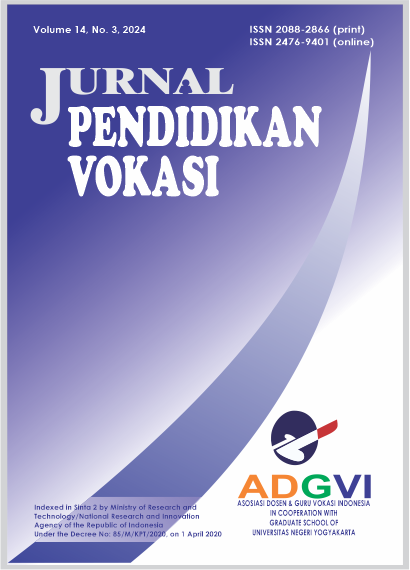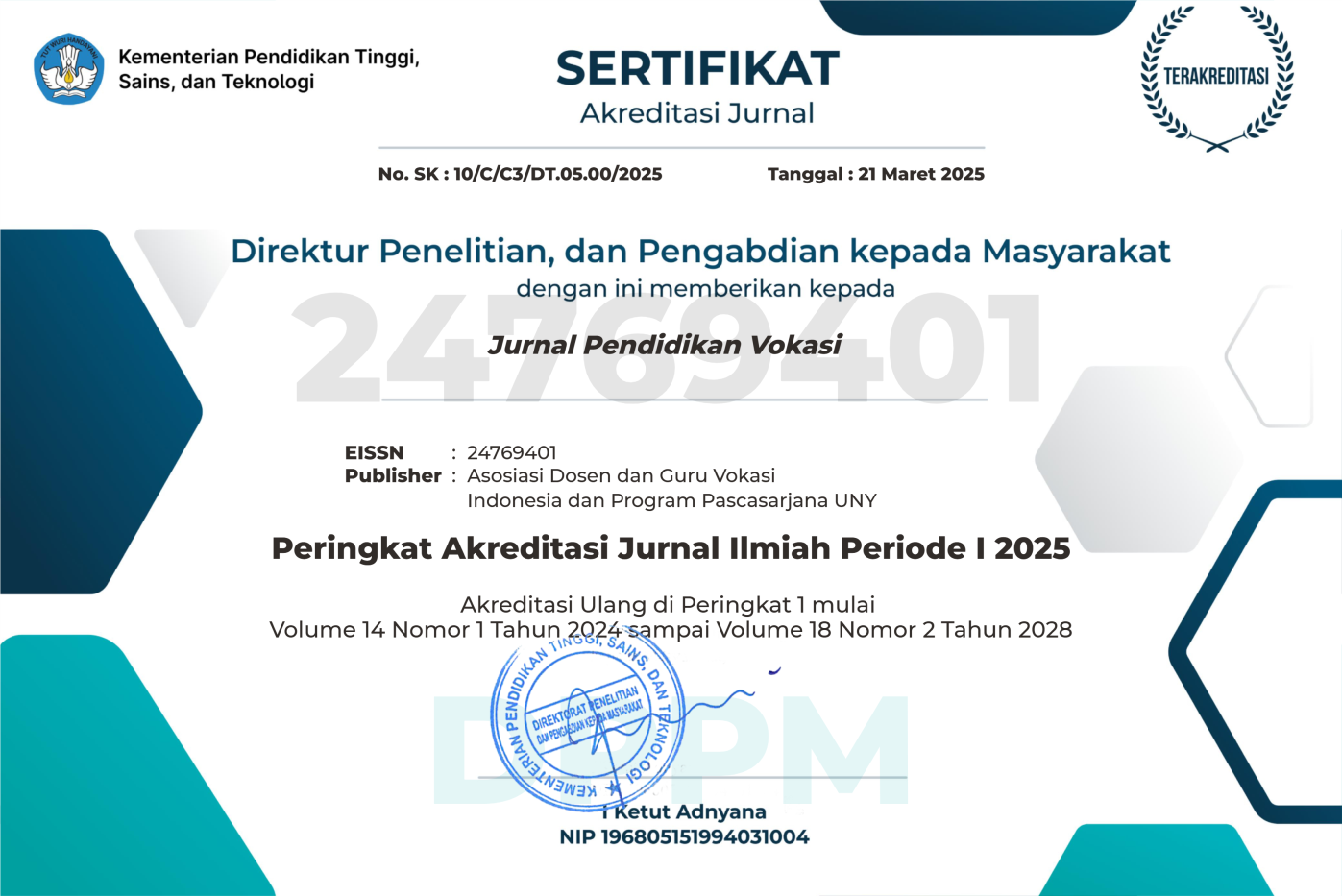Policies and implementation of decent work in vocational education for persons with disabilities in Zhejiang Province in achieving common prosperity
DOI:
https://doi.org/10.21831/jpv.v14i3.77864Keywords:
Decent work, Vocational education, Persons with disabilities, Employment policy, Zhejiang Province, Common prosperityAbstract
Decent work for persons with disabilities is a crucial aspect in enhancing skills, employability, and social inclusion. While developed countries have established comprehensive vocational training systems, limited research has explored how these initiatives are implemented in China at the provincial level. China’s 14th Five-Year Development Plan highlights vocational skill enhancement as a key strategy to protect labor rights for persons with disabilities. This study analyzes policies and strategic measures supporting decent work for persons with disabilities through vocational education in Zhejiang Province within the framework of common prosperity. Employing a qualitative descriptive analysis, the research reviews policy documents and existing vocational education practices. The findings reveal that the Zhejiang government has enacted multiple initiatives, including industry-based vocational training, digitalization of employment, and entrepreneurship support, to facilitate the integration of persons with disabilities into the workforce. Despite progress, challenges remain in enrollment, continuity of education, and resource availability. The study concludes that vocational education for persons with disabilities is not only a mechanism for skill enhancement but also a critical pillar in reducing socio-economic disparities. This research contributes both theoretically and practically by providing insights for policymakers and educators in developing inclusive employment policy models that can be adapted in other regions seeking to advance social equity and economic sustainability.
References
Centre for Agriculture and Bioscience International. (2022). Zhejiang. In CABI Compendium. CABI Compendium. https://doi.org/10.1079/cabicompendium.108699
Chen, X., Li, Y., & Yang, Y. (2022). Research on the decoupling relationship between co2 emissions and economic growth in Zhejiang Province. Polish Journal of Environmental Studies, 31(3), 2039–2047. https://doi.org/10.15244/pjoes/143845
Chen, Yanqing. (2024). Research on vocational regional to development by vocational education. Journal of Education and Educational Research, 11(2), 105–108. https://doi.org/10.54097/gt9z5w58
Chen, Yueyun. (2015). China’s path to sustainable, stable and rapid economic development: From the largest to the strongest manufacturing country. Journal of World Economic Research, 4(5), 8. https://doi.org/10.11648/j.jwer.s.2015040501.12
Clark, H., Coll-Seck, A. M., Banerjee, A., Peterson, S., Dalglish, S. L., Ameratunga, S., Balabanova, D., Bhan, M. K., Bhutta, Z. A., Borrazzo, J., Claeson, M., Doherty, T., El-Jardali, F., George, A. S., Gichaga, A., Gram, L., Hipgrave, D. B., Kwamie, A., Meng, Q., … Costello, A. (2020). A future for the world’s children? A WHO–UNICEF–Lancet Commission. The Lancet, 395(10224), 605–658. https://doi.org/10.1016/S0140-6736(19)32540-1
Fefoame, G. O., & Loryman, H. (2023). Towards a rights-based policy environment for the employment of persons with disabilities. In Handbook of Disability (pp. 1–15). Springer Nature Singapore. https://doi.org/10.1007/978-981-16-1278-7_93-1
Hsiao, Y.-J., Higgins, K., & Diamond, L. (2018). Parent empowerment: Respecting their voices. TEACHING Exceptional Children, 51(1), 43–53. https://doi.org/10.1177/0040059918790240
Hu, J., & Zhang, Y. (2014). A study on the technological innovation performance of the manufacturing industry in Zhejiang province of China. Proceedings of PICMET ’14 Conference: Portland International Center for Management of Engineering and Technology; Infrastructure and Service Integration, 2857–2866. https://ieeexplore.ieee.org/abstract/document/6921152
Li, W., Ni, T., Zhang, Y., Wang, D., & Parrado, S. (2024). Can people with disabilities obtain income by using skills learned from vocational trainings? Evidence from mainland China. Higher Education, Skills and Work-Based Learning, 14(2), 386–408. https://doi.org/10.1108/HESWBL-02-2023-0027
Ma, L., & He, Q. (2023). Study on influencing factors and mechanism of scientific and technological innovation talents gathering in Zhejiang Province. Open Journal of Applied Sciences, 13(12), 2371–2386. https://doi.org/10.4236/ojapps.2023.1312185
Millman, C., & Li, Z. (2017). Establishing a viable institutional environment for entrepreneurship in China: A case study of Zhejiang province. Strategic Change, 26(3), 237–242. https://doi.org/10.1002/jsc.2124
Qian, L. (2005). Improvement of Educational practice and environment for students with intellectual disabilities for active participation in society through employment. https://www.nise.go.jp/josa/kankobutsu/pub_d/d-249/d-249_1.pdf
Tao, L., Zhang, S., & Xu, J. (2019). Analysis of industrial structure change and employment effect in Zhejiang Province. Open Journal of Social Sciences, 07(10), 426–432. https://doi.org/10.4236/jss.2019.710037
United Nations Economic and Social Commission for Asia and the Pacific. (2022). Strategies to promote productive employment and decent work for persons with disabilities (pp. 33–55). United Nations. https://doi.org/10.18356/9789210011594c007
van Niekerk, A. (2020). Inclusive economic sustainability: SDGs and global inequality. Sustainability, 12(13), 5427. https://doi.org/10.3390/su12135427
Yang, R., Xia, H., & Zeng, Y. (2019). Analysis of the mode of higher vocational education for the disabled-take the mode selection in Sichuan Province as an example. Proceedings of the 4th Annual International Conference on Social Science and Contemporary Humanity Development (SSCHD 2018). https://doi.org/10.2991/sschd-18.2019.32
Yu, X. (2024). Research on innovative vocational education for disabled college students empowered by smart technologies in the perspective of new productive forces. Journal of Higher Vocational Education, 1(3), 104–111. https://doi.org/10.62517/jhve.202416317
Yuanchun, L., Yang, S., Fei, W., & Guangsu, Z. (2024). Construction and promotion of the demonstration zone for common prosperity. In Understanding China’s New Common Prosperity (pp. 107–150). Springer Nature Singapore. https://doi.org/10.1007/978-981-99-8787-0_5
Zhang, Y. (2023). An Analysis of the Path Selection for the Connection of Higher Vocational Education for Disabled Persons in China. Frontiers in Educational Research, 6(22). https://doi.org/10.25236/FER.2023.062216
Published
How to Cite
Issue
Section
Citation Check
License
Copyright (c) 2024 Jurnal Pendidikan Vokasi

This work is licensed under a Creative Commons Attribution-ShareAlike 4.0 International License.
The authors submitting a manuscript to this journal agree that, if accepted for publication, copyright publishing of the submission shall be assigned to Jurnal Pendidikan Vokasi. However, even though the journal asks for a copyright transfer, the authors retain (or are granted back) significant scholarly rights.
The copyright transfer agreement form can be downloaded here: [JPV Copyright Transfer Agreement Form]
The copyright form should be signed originally and sent to the Editorial Office through email to jpvokasi@uny.ac.id
Jurnal Pendidikan Vokasi by http://journal.uny.ac.id/index.php/jpv is licensed under a Creative Commons Attribution-ShareAlike 4.0 International License.













